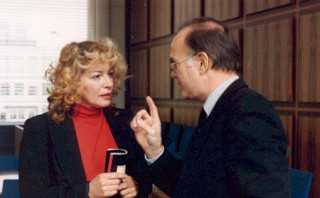
The Germans and Their Men
Germany | 1989 | 96 minutes | Color | 16mm/VHS | Subtitled | Order No. 99320
SYNOPSIS
PRESS
"Witty, critical, and sometimes outrageous."
"An incisive and wonderfully funny exposé."
"A worthwhile film for those wanting a fix on Germany's ruling male elite. Recommended."
SCREENING HIGHLIGHTS AND AWARDS
- London International Film Festival
- Montreal Women's Film Festival
- AFI Los Angeles International Film Festival
ABOUT FILMMAKER(S)
Born in Berlin, Sander attended school in Remscheid and drama school in Hamburg (1957/58). Sander married a Finnish author Markku Lahtela in 1959 and had a son, Silvio, before moving to Helsinki, where she directer directed and performed in Ernst Toller's play "Der deutsche Hinkemann" three or four times a week, as well as a production of Grass' "Noch zehn Minuten bis Buffalo." If that weren't enough she also taught classes on drama and improvisation. In 1964, she worked as a director for Finnish TV, but when she returned to Germany the following year, she couldn't find work. So, she began her studies at the Deutsche Film- und Fernsehakademie in Berlin (Berlin film and Television Academy), becoming one of its first graduates. Active in the students' movement, Sander founded the "Aktionsrat zur Befreiung der Frau" in 1968 and spoke at the SDS (Socialist German Students)-conference in Frankfurt, where she stressed that women are only accepted when they adapt - not only in society as a whole, but in the students' movement too.
Her speech is often considered the beginning of the New German Women's Movement.
She co-founded the women's group "Brot und Rosen" in 1972 and the journal Frauen und Film in 1974, which became the first European feminist film journal. Sander was the journal's editor until 1981.
Her first feature-length movie Redupers (Die allseitig reduzierte Persönlichkeit - Redupers) appeared in 1977. Although most of Sander's films emphasize the role of women, The Subjective Factor (1980/81) deals with the beginning of the New Women's Movement. Love is the Beginning of all Terrors (Der Beginn aller Schrecken ist die Liebe) (1984) is a satire on sexual politics.
Now, Sander has produced many short films and documentaries and also works for German TV. Since 1981, she's been a professor at the Hochschule für bildende Künste in Hamburg. She writes for the taz Berlin and for Frauen und Film, and lives in Hamburg and Berlin. (09/09)
